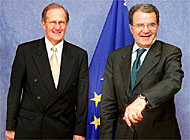Switzerland and EU to begin new round of bilateral negotiations

Switzerland and the European Union are to start a new round of discussions on further bilateral agreements later this year. The decision was announced after a visit to Brussels by the Swiss foreign minister, Joseph Deiss.
Deiss and the European Union commissioner for foreign relations, Chris Patten, said expert-level talks would begin in the autumn.
Patten re-stated that tax evasion would be high on the agenda. Switzerland, for its part, is seeking new areas for bilateral agreements such as the media, statistics and education, following the ratification of seven accords which are due to come into effect in January.
Patten said the European Commission would give the go-ahead to negotiations during the course of this week. One of the most controversial issues is likely to be the EU’s demand for non-member countries, including Switzerland, to signal their willingness to cooperate with an agreement compelling them to report the assets of non-residents.
Deiss spoke of the need for balance in bilateral talks. He said Switzerland had no desire to be seen as a haven for tax exiles, but wanted to retain banking secrecy.
He also stressed Switzerland’s interest in broadening negotiations to include security and asylum policies.
At their 45-minute meeting on Tuesday, Deiss and Patten also reviewed the ratification process for the seven accords between Switzerland and the EU, which Swiss voters approved in a referendum on May 21. Patten said the accords were beneficial to both sides, and urged individual EU states to ratify them as soon as possible.
The bilateral agreements are supposed to come into force on January 1, 2001, once they have been ratified by the parliaments of all 15 EU member states.
However, a Swiss journalist in Brussels, Regula Schmid, says EU ratification of the accords is going more slowly than expected.”There’s no basic opposition to the agreements. It’s just that it’s taking much longer than thought to go through the national parliaments.”
swissinfo with agencies

In compliance with the JTI standards
More: SWI swissinfo.ch certified by the Journalism Trust Initiative
You can find an overview of ongoing debates with our journalists here. Please join us!
If you want to start a conversation about a topic raised in this article or want to report factual errors, email us at english@swissinfo.ch.